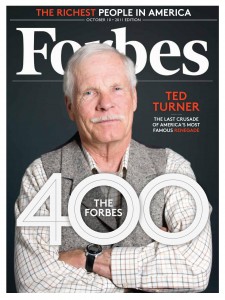
FORBES MAGAZINE
At age 72 Ted Turner isn’t quite as pugnacious as he once was. He no longer refers to pro-lifers as “bozos.” It’s been years since he challenged onetime media rival Rupert Murdoch to a fistfight. And while he is a true believer in climate change, he’s abandoned his prediction of a planet where most of the population will die off, leaving only a few cannibals to roam the scorched Earth.
There are still flashes of the old Mouth of the South—as when he gets excited about one of his causes. “I like the elephants and the gorillas and everything, too,” he says during a recent sit-down. “But I have to say, if I had to pick one species, I’d pick women.” (He has been married and divorced three times.) Still, he has become a champion of women’s rights in the developing world. “The worst thing that’s perpetrated on women is female genital mutilation,” he says. “They’re not taking their knives out and cutting the wackers off little boys. … You cut the clitoris off so you can’t enjoy sex, and it’s really painful. I’ve never had it happen to me, but I’m just going by what I’ve read.”
Yes, Turner has mellowed—somewhat. “Once I was let go from Time Warner,” he says, “I decided … I’m dedicating most of my time to trying to save the world.” And much of his remaining $2 billion fortune, too. Captain Outrageous has morphed into Captain Planet, who wants to protect endangered species, end poverty, embrace population control, achieve nuclear disarmament. He has drawn closer to his five children, all of them board members of the Turner Foundation and each continuing his own interests in nature and the media. There is a discernible spouselike ease between him and his girlfriend, Elizabeth Dewberry, a novelist who is 25 years his junior. “I’m still working on [my legacy],” says Turner. “I haven’t finished yet.”
He is proud of small accomplishments. “Is that beautiful or not?” Turner asks, pointing out the window of his office in the Turner Building toward a street-level lot covered in dozens of solar panels in downtown Atlanta. “Parking lots are wastelands because they’re black and they absorb the heat rather than reflect. I’m gonna start a movement to paint parking lots white instead of black.”
What he doesn’t point out is the landmark five blocks away: the CNN Center, Turner’s greatest accomplishment. Today, amid the gleaming glass and the images of Headline News, Anderson Cooper and Piers Morgan beamed across giant screens, it’s hard to fathom the impact the 24-hour cable news channel once had when it launched back in 1980. There was nothing like it then, and news was breaking out all over the world: the takeover of the U.S. Embassy in Tehran; a peace treaty between Israel and Egypt; boycotted Olympics Games thanks to the Soviet invasion of Afghanistan; the start of the Iran-Iraq war; the Mariel boat lift from Cuba; Lech Walesa’s first strike in Poland’s Gdansk shipyards; an epic presidential election that swept Ronald Reagan into office. You could read about these events in Time or Newsweek or the New York Times, but CNN let you watch them, again and again, throughout the day.
With CNN, Turner—the crazy skipper of the Courageous who had successfully defended the America’s Cup; the mercurial owner of the hapless Atlanta Braves who was inspired to hire, fire and rehire Bobby Cox as manager—had suddenly achieved the stature of a global ambassador. “I went around the world making friends, because that’s the best thing to do with your customers,” Turner recalls. “And I’m talking about Communist China, Russia, which was the Soviet Union at the time.”
Please visit Forbes.com to read the full article
Originally published in Forbes October 10, 2011


















